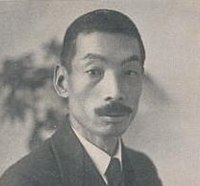You can help expand this article with text translated from the corresponding article in Japanese. (December 2020) Click [show] for important translation instructions.
|
Hajime Kawakami (河上 肇, Kawakami Hajime, October 20, 1879 – January 30, 1946) was a Japanese Marxist economist of the Taishō and early Shōwa periods.
Hajime Kawakami | |
|---|---|
 Kawakami Hajime | |
| Born | October 20, 1879 Iwakuni, Yamaguchi, Japan |
| Died | January 30, 1946 (aged 66) Sakyō-ku, Kyoto, Japan |
| Occupation | Writer, Economist |
| Subject | Marxism |
Biography
editBorn in Yamaguchi, he graduated from Tokyo Imperial University. After writing for Yomiuri Shimbun, he attained a professorship in economics at Kyoto Imperial University. Increasingly inclined toward Marxism, he was involved in the March 15 incident of 1928 and was expelled from the university as a subversive. The following year, he joined the formation of a political party, Shinrōtō. Kawakami went on to publish a Marxist-oriented economics journal, Studies of Social Problems. After joining the outlawed Japanese Communist Party, he was arrested in 1933 and sent to prison. After his release in 1937, he translated Das Kapital from German to Japanese. Kawakami spent the remainder of his life writing essays; novels; poetry; and his autobiography, Jijoden, which was written secretly between 1943 and 1945 and serialized in 1946. It became a best-seller and was "extravagantly praised as being unprecedented in Japanese letters."[1]
References
edit- ^ Dower, John W. (1999). Embracing Defeat: Japan in the wake of World War II. New York: W.W. Norton & Co. p. 191. ISBN 0-393-04686-9.
External links
edit- Takutoshi Inoue and Kiichiro Yagi, "Two Inquirers on the Divide: Tokuzo Fukuda and Hajime Kawakami" (Faculty of Economics, Kyoto University)